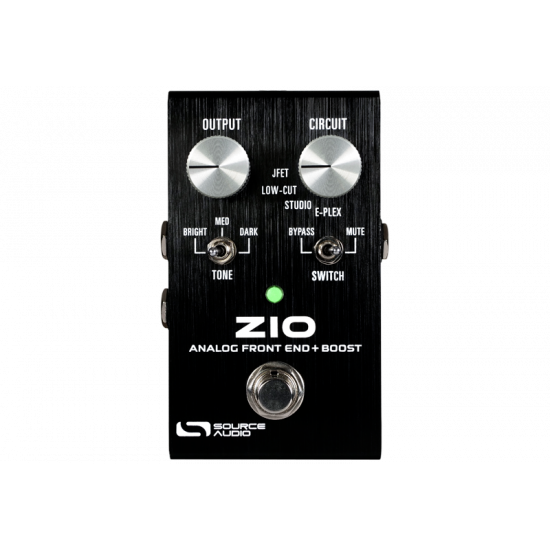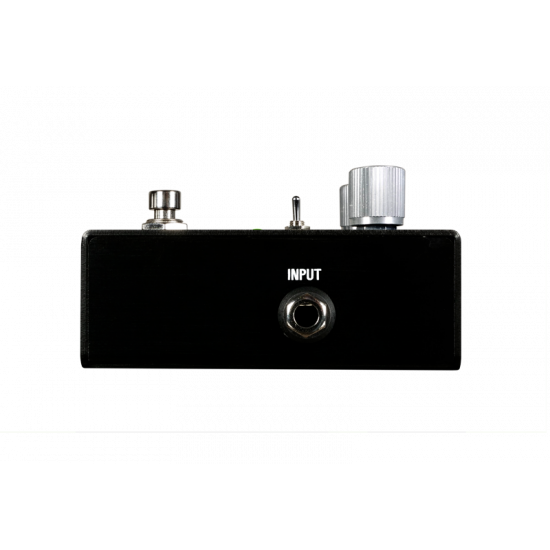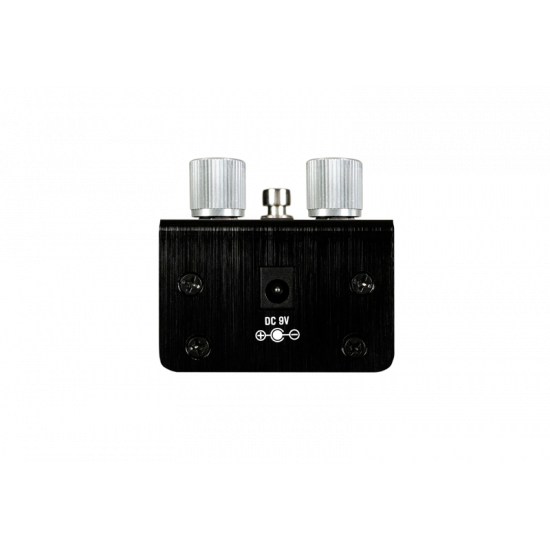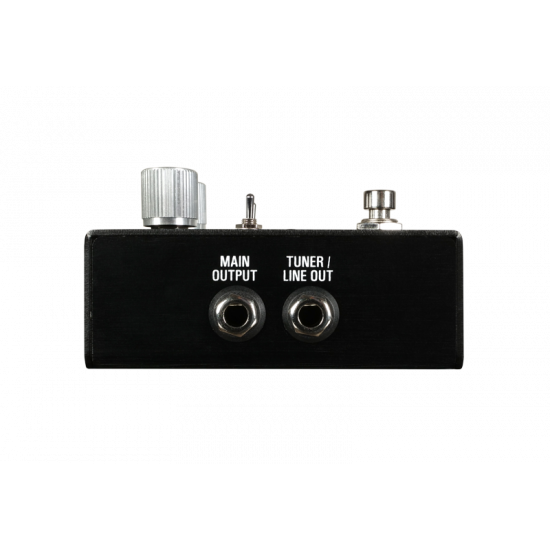







- Stock: Out Of Stock
The goal in creating the ZIO Analog Front End + Boost was simple yet ambitious: “Make Everything Sound Better!” ZIO is an all-analog preamp/boost pedal that includes a choice of four distinct preamp circuits, each with up to +20dB of additional output boost. ZIO is Source Audio’s first all-analog effects pedal and designed in collaboration with Christopher Venter, the owner and sole engineer at SHOE Pedals.
ZIO is a deceptively flexible unit that can serve many different purposes at various places in your signal path. Use it at the front of your chain of effects to shape the rest of your outgoing tone, after your drive pedals as an overall tone sweetener or clean volume boost, or at the the end of your pedalboard to drive a long cable run or as a restorative device to recreate the sound of your guitar going directly into the input of your amplifier. You can also use the ZIO in your amp's effects loop if you want to drive your power amp even harder, or to compensate for a level mismatch between two channels.
"The Better Box"
The word "ZIO" is an acronym for Impedance (“Z” is the electrical symbol for impedance), Input (“I”), and Output (“O”). The pedal is designed to take a guitar’s high impedance signal, sweeten the tone with any of its four preamp circuits, and output a strong, low impedance signal that won’t be altered by the buffered dry tones of effect pedals further down the signal chain. High fidelity, noise-free Burr-Brown op amps help give ZIO extreme clarity and responsive pick dynamics, while maintaining ideal body and warmth. ZIO has four distinct preamp circuits. JFET offers a completely transparent signal boost with zero coloring or distortion. LOW-CUT reduces “tubby” bottom-end for a tighter sound with added headroom. STUDIO finds inspiration from the time-honored “Pultec Trick,” a studio technique that adds clarity by cutting the “mud frequencies” and adding mid-range articulation. E-PLEX captures the focused and subtle grit of the preamps found in vintage Echoplex Tape Delay units. The ZIO’s TONE toggle offers three different levels of capacitance (or simulated cable length) to brighten or darken the tone.
Match the Circuit to Your Rig...
ZIO offers four discrete preamp circuits: JFET, LOW-CUT, STUDIO, and E-PLEX. Each circuit has its own unique character and has been carefully crafted to maximize feel and performance. JFET, LOW-CUT, and STUDIO are all chiefly low-distortion circuits, while E-PLEX will add a bit of grit to your signal at most output levels. Each preamp circuit comprises the highest quality components and features all-original circuit design.
JFET
This preamp mode is similar in character and behavior to a clean tube amp input with very low distortion. Using high quality JFET Input Burr Brown OP Amps, this mode is transparent and will not add any harshness or excessive brightness. JFET mode is also very helpful in a studio or home recording environment for delivering a more natural sound to the DI or line inputs found on many pieces of studio equipment. Due to its design, JFET mode can also interface with lower impedance line inputs without excessive loss of bass content.
LOW-CUT
The LOW-CUT mode is designed to remove excessive low frequency rumble and buildup that makes it more difficult to get guitars (and sometimes basses!) to sit well in a mix. The LOW-CUT preamp has no impact on the low midrange or presence frequencies, and, instead, reduces the "low lows" to improve headroom and provide a tighter sound. This is especially useful on guitar neck pickups, some basses, synths, and any other sound that may be too "boomy" and overpowering in a live or studio mix.
STUDIO
STUDIO mode is based on a pair of popular studio mixing tricks used on guitar and bass. It combines an EQ curve based on the famous "Pultec Trick" (used on records since the 1950s and still today) in combination with other tried and true methods to improve clarity. This mode provides a low mid cut to remove "mud" frequencies, a gentle presence boost in the upper midrange, and a natural-sounding high pass filter, to reduce low frequency rumble. With this mode, you can achieve a more "polished" sound that is intended to fit guitars and basses more clearly in a mix. Without all of that extra bass and mud, you also will gain more volume in the most useful frequencies. This mode works very well after fuzz and overdrive pedals for tone shaping as well!
E-PLEX
A recreation of the feel, character, and frequency response of a classic early 1970s tape echo unit, the E-PLEX mode offers a vintage-style FET buffer/boost tone that is warm, clear, and a little bit dirty. Many players used to turn off the echo on these old units and simply use the dry preamp for its tone and feel as an always-on effect. In the original units, the output impedance was quite high, and this led to a high frequency roll off with long cable runs. This was difficult to control, but also part of the unit's top end character.
Cable Length is Tone
When we connect a cable to the output of a passive guitar pickup, it does more than just pass signal on to the next device. Many guitarists will be familiar with the idea of different cables imparting a specific tonal quality. This is because cables have a property called capacitance, which increases with the length of the cable. This capacitance interacts with passive pickups and guitar wiring, to create a resonant filter and the higher the capacitance of the cable, the lower the cut-off of the resonant frequency.
The three toggle positions replicate different lengths of cable. Select the BRIGHT position to introduce a low capacitive load and the most treble content. Selecting MED provides additional capacitance and produces the effect of a medium length of cable (roughly 15 feet). Selecting the DARK mode gives the effect of a longer cable or coils cable and is useful for taming excessive brightness or providing a stylistic voicing choice.
A Higher Quality Op Amp
After bench-testing some classic op-amps used in overdrive, distortion, and boost stompboxes such as the ubiquitous TL072 and about half a dozen popular op-amp chips spanning back to the 1970s, we selected the Burr Brown for its pure tonality, dynamic range, frequency response, and overall feel.
While other chips had certain properties such as sounding "too bright", "too thin", "too distorted", etc., the unmatched transparency and headroom of this 14-legged Burr Brown OPA chip was the perfect match for the ZIO's mission of delivering you your own tone, but better.
Features and Specifications
- Circuit knob with four distinct preamp circuits: JFET (transparent, flat frequency curve), LOW-CUT (cuts lows without affecting mid to high frequencies), STUDIO (replicates “Pultec Trick” equalization), E-PLEX (inspired by the preamp in an vintage Echoplex Tape Delay unit)
- High quality components and Burr Brown JFET op-amps
- Output control with up to +20dB of signal boost
- 3-way Tone toggle switch with bright/medium/dark cable capacitance voicing
- 2-way Footswitch Action toggle switch (with always-on “Mute” option)
- Extra Tuner/Line Output
- True Bypass
- Input Impedance: 1 Mega Ohm (1 MΩ)
- Output Impedance: 150 Ohm (150 Ω)
- Power Consumption: 9V DC center negative @ 20mA
- Brushed anodized aluminum housing
- Dimensions: L: 4.1 in./10.5cm x W: 2.36 in./6cm x H: 2.22 in./5.65cm (including knobs)
ZIO Analog Front End + Boost: User Manual
WATCH THE DEMO HERE

_Top_Hi_V01_180117-60x60.png)

